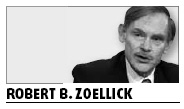Working toward a climate-smart future
The world's poor will bear the brunt of the impact of global climate change. As the planet warms, rainfall patterns shift, and extreme events such as droughts, floods, and forest fires become more frequent. Millions in densely populated coastal areas and in island nations will lose their homes as the sea level rises. In Africa, Asia, and elsewhere, poor people face prospects of tragic crop failures, reduced agricultural productivity, and increasing hunger, malnutrition, and disease. It will become even harder to attain the Millennium Development Goals - and ensure a safe and sustainable future beyond 2015.
For the people of the developing world - even as they strive to overcome poverty and advance economic growth - climate change threatens to deepen vulnerabilities, erode hard-won gains, and seriously undermine prospects for development. At the same time, they fear limits on their critical call to grow their economies, expand opportunity, and develop energy or new rules that might stifle their many needs, from infrastructure to entrepreneurism.

Climate change is one of the most complex challenges of our young century. No country is immune. Alone, no country can take on the interconnected challenges posed by climate change, which include controversial political decisions, daunting technological change, and far-reaching global consequences.













